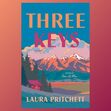When I set out to write my sixth novel, I was having the worst summer of my life, hands down. I was not alone in this bad-summer experience—this was 2020 and Covid was upending everyone’s plans, and on top of that, what became Colorado’s largest wildfire was burning outside my house. My home sits at the base of a mountain, so evacuees were streaming by, stock trailers loaded with goats or horses or belongings, but also non-human evacuees, like elk and mountain lions and bears, all dislocated as well.
Of course, I did what I always do when stressed: I started writing. Like so many people, I hardly traveled that year, even when I wanted to escape the hazardous air quality, I stayed put and wrote. The next year, I also stayed put, not straying far from my couch for another reason, which was a terrible life-altering case of Covid.
Playing with {Wild}Fire is my small effort to be a part of the climate conversation in fiction. A polyphonic novel, each chapter is narrated by someone in the community, including, sometimes, the bear or aspen trees or mountain itself. The vast majority of chapters are told in some experimental way—there are hermit crab stories, epistolary stories, flash stories, and prose poetry.
My ardent hope is that more realistic and imaginative stories take on the subject of our burning planet, that we can respond to our reality and our grief and our hope. From devastation comes renovation. Through experiment, we find solutions. We will, I believe, find new ways to live on Planet Earth, and yeah, it will likely start with suffering, which will lead to stories.
I'm delighted it's just got two starred reviews! May I share them?
Starred Reviews
From Booklist
Who would view the confluence of COVID-19 and Colorado’s wildfires as a good thing? Virtuoso novelist and nature writer Pritchett (The Blue Hour, 2017) contemplates these dual disasters from the perspectives of a disparate group of characters whose experiences force them to process some soul-searching evaluations. Of varying ages and backgrounds, political viewpoints and economic wherewithal, the people (and owls and bears, even trees) who call Sleeping Bear Mountain home appreciate their surroundings and acknowledge the threats in equally diverse ways. When evacuations force everyone and everything from their homes, be it A-frame or cave, tree branch or horse ranch, the loss of habitat is felt by humans at an almost animal level and vice versa. In Pritchett’s empathic telling, we feel for Mama Home Bear and White Owl as viscerally as we do for Gretl and Sherm. Pritchett’s creativity is boundless as she bends formats and blends voices in this vibrant paean to nature’s fragility. “How shivering beautiful that we all watch one another in this blink of time, the mountain mumbled.” At levels both micro and macro, Pritchett brings an electric connectivity to her portrait of the precariousness of this one wild, threatened world.
— Carol Haggas
From Foreward
Laura Pritchett’s Playing with Wildfire is a rare climate novel of now. It begins in late August, as a megafire started by a visiting hiker sweeps through Colorado along with COVID-19. Prose, poetry, plays, government grant applications, astrological natal charts, obituaries, graffiti, and maps distill the impossible weight of a rural community and planet in distress into a plea to “think of all who have loved this place” and demand radical, restorative action.
A work of great heart and imagination, the novel utilizes multiple forms and perspectives to construct its narrative. As one character states, winking at the meta: “like the pandemic, these megafires present a new type of suffering—both for land and human. The suffering feels like experimentation. Requires new stories told in unique forms and techniques.” There’s also tenacious attention paid to the warts-and-all truth of rural Colorado, preventing abstractions.
The book’s protagonists range from various wild animals escaping the fire to the mountains the fire ravaged; they include emergency services personnel and locals too. All struggle to process the grief and rage of knowing—that these tragedies were predicted and predictable; that their present crises cannot be undone; that proximity, or the lack thereof, is a crucial ingredient for action and empathy; and that their community’s geographical and emotional distance from decision makers, pundits, and lobbyists means no one is likely to listen to their plea that “the planet is burning. We need to get the fires out. Then we can discuss other stuff.”
Fierce, vivid, and closely observed, Playing with Wildfire is an exercise in paying attention. And if “attention is the most basic form of love,” the earth is not the only thing in danger. Love is an endangered ecology too, and there is an inherent mutualism to what’s required for healing.
— Letitia Mongomery-Rodgers
Published on December 28, 2023 14:18
 newest »
newest »
 newest »
newest »
 I can't wait to read this! I work for my local Public Library and just submitted your book as a suggested purchase to add to our collection. Congrats on the book and the reviews!
I can't wait to read this! I work for my local Public Library and just submitted your book as a suggested purchase to add to our collection. Congrats on the book and the reviews!




